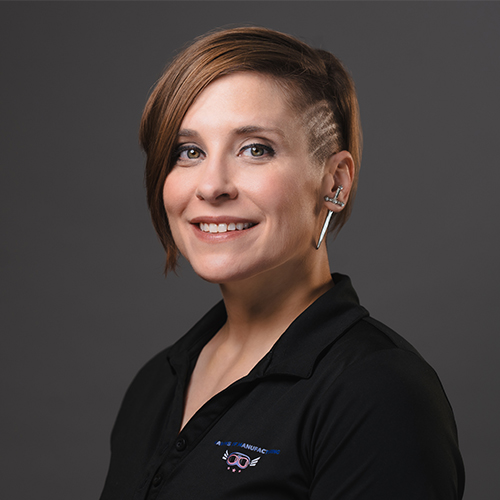Meaghan Ziemba, creator of the video series and online platform Mavens in Manufacturing, discusses why highlighting the voices of women in manufacturing is critical for the future of the industry.

Meaghan Ziemba
Creator, Mavens in Manufacturing
You’ve been a strong voice for women in manufacturing, especially through your Mavens of Manufacturing platform. What inspired you to start this initiative, and what has been the most rewarding aspect so far?
Honestly, during COVID, I was really frustrated with the conversations happening on LinkedIn. So many of them were focused on big industry trends and challenges, but none of them featured women in the space — women who I knew were doing incredible work. I tried suggesting some of them as guests on podcasts and shows, but nothing ever came of it. That’s what pushed me to start Mavens of Manufacturing. I wanted to create a platform that highlights the voices of women in the industry, those who are making real change and doing amazing things.
The most rewarding part has definitely been the conversations. I’ve learned so much from the women I’ve spoken with — their frustrations, their achievements, and their stories. What’s been really impactful is hearing from other women afterward, who say, “I thought I was the only one going through this.” It’s powerful to create that sense of connection. Younger women have reached out, too, saying they didn’t know opportunities like this even existed, opportunities that actually align with their creative or critical thinking skills. They grew up thinking they only had a few paths to choose from, and “Mavens” helped show them there’s so much more out there.
What do you see as the most effective strategies for attracting younger people, particularly women, into manufacturing careers?
Manufacturing isn’t just technical manuals; it’s full of exciting projects, innovation, and real-world impact. Sharing stories like a company making components for the cameras that helped catch the Boston bomber helps show why this work matters. We also need to be more transparent about pay, benefits, and growth opportunities, since many job postings don’t include salary or clear career paths. Highlighting these practical details alongside the creative and meaningful aspects of the work will attract a broader, more diverse talent pool, especially young women.
You’ve interviewed so many incredible women in manufacturing. Are there any common threads or recurrent themes you’ve noticed in their stories?
A common theme I hear from women in manufacturing is that many didn’t know these careers were an option, or they fell into them by accident. Those who chose the path often had family or close mentors encouraging their curiosity. This highlights the need to start outreach much earlier, even in elementary school, by introducing kids to basic concepts through fun, hands-on activities. For example, Batesville Products uses children’s books and interactive projects like making chocolate molds to spark curiosity about manufacturing. Early, engaging education can help nurture interest and improve the recruitment and retention of women as they grow older.
How do you think storytelling, especially through platforms like Mavens in Manufacturing, can help shift outdated narratives about who belongs in the industry?
Manufacturing can seem cold and impersonal, but sharing real stories from people working in the industry makes it more human and relatable. Platforms like Mavens of Manufacturing reveal the full, authentic experience, showing both the challenges and the grit women face, from self-doubt to overcoming disrespect. Many women are paving the way for future generations with an “I’m taking you with me” mindset, inspiring younger women to see themselves in manufacturing.
Storytelling is key to attracting a more diverse workforce, including women, veterans, differently-abled individuals, and people of color, by highlighting the opportunities and real-life journeys within the industry. There’s a woman named Kara Branch who founded Black Girls Do Engineer about three years ago. She started the organization in Houston, Texas, and has since expanded to chapters in San Francisco, Oakland, Atlanta, New York, Memphis, Detroit, Chicago, Las Vegas, Los Angeles, Washington D.C., and Johannesburg, South Africa.
What message would you give to a young woman who is hesitant about pursuing a career in manufacturing?
I think manufacturing is way bigger and more diverse than most people realize, offering paths in design, engineering, robotics, logistics, leadership, and so much more. I’d tell women to go for it and not fear failure, because failure is how we learn and grow. This field welcomes all skillsets: mathematicians, scientists, artists, athletes, and leaders alike. It’s not about perfection but about creativity, problem-solving, and making meaningful work that impacts everyone’s lives. If any woman is unsure about her place, I guarantee she’ll find a space to thrive in engineering and manufacturing, so she should just dive in and pursue it.

